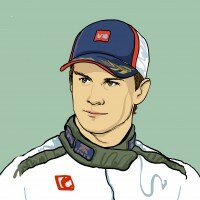
They called him François the Magnificent…
A mix between the smashed youth of James Dean and the lucid blue eyes and magnetism of Alain Delon.
François Cevert could have been a concert pianist, an actor or a merely the scion of a well-to-do family. But he chose motor racing. A look back at the shining and shattered career of a Formula 1™ icon.
Formula 1™ has had its fair share of playboys, inveterate charmers and compulsive ladies’ men. François Cevert, appeared to belong to another category. He was one of a kind: something of a mix between the smashed youth of James Dean and the lucid blue eyes and magnetism of Alain Delon, Cevert remains the subject of fantasy almost forty years after his death in Watkins Glen on 6 October 1973 during the qualifying for the United States Grand Prix. In a cruel twist of fate, the Frenchman had won his only F1 victory two years earlier on the same track.
Like Gilles Villeneuve a few years later, the man who was born Albert François Cevert Goldenberg in 1944 in a still-occupied Paris won hearts and minds by his charisma as much as by his prowess at the wheel. He had everything going for him. He was handsome, gifted and knew how to stay out of the limelight. To the press, he was simply “The Prince”. There was talk of affairs with Brigitte Bardot and Alexandra Stewart. He did nothing to quell these rumours and enjoyed teasing his regular girlfriend Christina de Caraman. The driver was a prince without a crown who learnt his trade in the shadow of Jackie Stewart, his team-mate and Pygmalion at Tyrrell.”Over time, he would have become a better driver than me,” said the British triple world champion. Cevert did not achieve the biggest number of wins, but the public soon made a favourite of him. The world of cinema also beckoned. But Cevert always refused, claiming he was “not a good actor”. By then, he had already set his sights on becoming the first French world champion. “If someone could prove to me beyond doubt that I wasn’t cut out for driving, I’d stop straight away,” he said one day. “Because then I’d know I wasn’t the best. “


From pianist to salesman
Everything seemed to come easily to Cevert, as if handed to him on a plate. And yet behind the smiles and winks of this handsome man, there was a cold but never arrogant determination, the fruit of an upbringing which was far less simple than the home straight at Monza. The son of a jeweller, a child of the middle classes in Neuilly-sur-Seine, he escaped the future originally planned for him. His father dreamed of his becoming a classical concert pianist, giving recitals in the greatest halls. Until he was 19, François Cevert practised the instrument diligently: “I was passionate about music and spent 12 years at the Conservatoire. I spent my Sundays playing, by ear, pieces by players I had recorded on my tape recorder. During adolescence, he turned into something of a boy racer. He roared down the avenues of Paris on his first scooter. His father disapproved already: “He saw me come home with grease all over my hands and asked me how I’d be able to play the piano in that state.” When he decided to dedicate his life to racing, his father threw him out. The son of this well-off family now had to fend for himself. He turned impromptu door-to-door salesman to finance his passion.

It was not an easy beginning. In his first season as a single driver, he finished 6 races out of 22. With a smile, his then girlfriend Nanou van Malderen describes these lean years of scraping by: “We’d arrive at the hotel, wait until the receptionist fell asleep and sneak into the first empty room.” “We’d scarper first thing in the morning to avoid being caught.” The persistence paid off. François Cevert earned the chance to drive in Formula 1™ in 1970 and made a living from his passion. After a season learning the ropes, his talent finally came to the fore. France had found its Champion. In 1974, Cevert was to replace Stewart as No. 1 at Tyrrell. But his fate was sealed. He attached no importance to the clairvoyant who had told van Malderen that her boyfriend “would not live to see his thirtieth birthday”. He was aware of the risks of the job. He did not see himself as a daredevil: “Before trying to overtake at a crazy moment, I’d tell myself that I won’t be a hero if I’m dead.” He was wrong. His tragic death turned him into a Formula 1™ icon. Unbeknownst to him he became the first idol of a 13-year old Brazilian. By the name of Ayrton Senna.
By Alexandre Pedro


